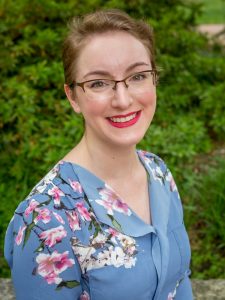Queer Graduate and Professional Students initiative offers community, resources to students
Finding community is essential for any graduate student to be fully successful.
At the University of North Carolina at Chapel Hill, The Graduate School and the LGBTQ Center partner to provide community and resources for LGBTQIA-identified graduate students. Queer Graduate and Professional Students (QGAPS), formerly known as Queer Grads, offers a social hour, a speaker series and more. The initiative is part of Diversity and Student Success within The Graduate School.
Clinical psychology doctoral student Kimberly Pentel is a member of the QGAPS advisory board. QGAPS has provided her with mentorship, peer support and other resources, she said.
“The most powerful thing is that when I walk into QGAPS events, it feels like a weight off my shoulders,” she said. “It really just felt wonderful to have a space where it’s all graduate students, where they understand the research grind, what a dissertation is about, and the unique situations that may arise from being simultaneously queer and in grad school.”

Maria Dykema Erb, co-director of Diversity and Student Success, said it is important to provide all students from diverse backgrounds with the tools, support and encouragement they need to be successful graduate and professional students at UNC-Chapel Hill.
“Creating a welcoming and safe space for LGBTQIA-identified students across campus will only serve to create a positive experience for them during their time at UNC and allow them to focus on the goal at hand – completing their degree and becoming a successful alum,” she said.
Leah Taraskiewicz, who recently graduated with her master of public health degree, served as the graduate assistant for QGAPS and the LGBTQ Center. Earlier this year, QGAPS hosted a panel of out faculty and staff speaking about their experiences working in a university setting.

“Especially when we think of grad and professional students, a lot of students are going into academia and going into research and looking to their faculty members, to their advisers, to people who are teaching them, looking for representation and looking to know that it’s possible to get to a point of being a faculty member who’s tenured and also LGBTQ,” Taraskiewicz said.
Manuel Hernandez, geography doctoral student and president of the Graduate and Professional Student Federation (GPSF), said the collaboration between QGAPS and GPSF is critical because it provides a platform for LGBTQIA-identified students to express themselves and it allows the student body at large to understand the diverse issues impacting their peers.

“Graduate school is a challenging journey that places many pressures on the student to succeed at all costs,” he said. “The added pressures as a LGBTQIA student can feel overwhelming at times and inhibit from reaching one’s potential. The LGBTQIA community and resources at UNC provide the support and space for many of us to succeed in our different graduate or professional programs.”
In fall 2017, the Queer, Transgender People of Color (QTPoC) Grads group was formed within QGAPS. The group offers affirming space and the opportunity for peer support and community building, said Mariel Eaves, administrative support specialist at the LGBTQ Center.
“Events like QTPoC Grads Social Hour help remind students that they are valued for simply existing,” Eaves said. “Providing care via food and camaraderie is a very simple and common human action – I think having that with a group of people who share similar experiences, anxieties and challenges promotes the resilience needed to continue towards one’s goals.”
Visit the QGAPS website to learn and more and sign up for the QGAPS listserv.
Student advice for incoming LGBTQIA-identified grads beginning their studies at Carolina
“Seek out and form your support networks when you first arrive to UNC. Be sure to take care of your physical/mental health and don’t be afraid to ask questions or for help.”
–Manuel Hernandez, geography doctoral student and GPSF president
“Start early figuring out what’s available and who your people are, and lean into that.”
– Leah Taraskiewicz, MPH graduate
